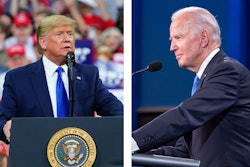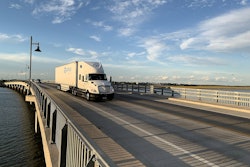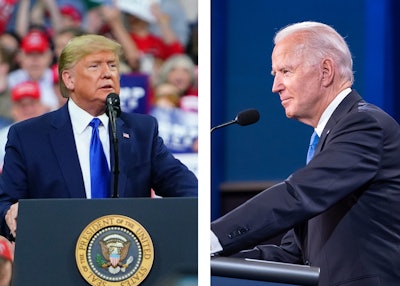 According to data from the Federal Election Commission, trucking’s political dollars heavily favor a Trump re-election.
According to data from the Federal Election Commission, trucking’s political dollars heavily favor a Trump re-election.Whether it’s the clash between Republican incumbent President Donald Trump and Democratic challenger former Vice President Joe Biden or potential turnover in the Senate, the outcome of Tuesday’s election will impact the transportation industry.
Aside from appointing a new Federal Motor Carrier Safety Administration (FMCSA) chief the winner of the upcoming election will certainly play a role in driving GDP growth in the coming term, but COVID will be riding shotgun. Increasing infection rates and a potential vaccine will weigh heavily on either a Republican or a Democratic White House.
“Putting that aside for a minute, I think a continuation of the Trump Administration would be marginally better for the economy, for both the consumer economy and the industrial economy, and a lot of that stems from the fact that Mr. Trump is not a conventional politician,” said John Larkin, Clarendon Capital Operating Partner. “He comes at it from a different perspective and understands that a lower income tax rate – a lower capital gains tax rate – stimulates a lot of investments. Investment stimulates a lot of economic activity [and] more jobs are created.”
Even if a vaccine is developed and deployed relatively soon, JBS Logistics President Alec Gizzi said he thinks the spending habits of the American consumer have changed so much in the last nine months “that I think you’re going to need until at least 2024 before things get back to normal – travel and everything else.”
“We have not done a good job of controlling the virus and that has lead to enormous unemployment – 250,000 less manufacturing jobs now that we had in February,” he added. “I’m optimistic that the old Joe Biden will manage the recovery post-COVID, but I’m also more optimistic that Joe Biden can get us out of this COVID situation better than the current president has just because he’s still denying it even though he had it.”
Larkin said it’s difficult to measure the potential impact of a Democratic-led White House because he is unclear which version of Joe Biden is seeking election – “the old Uncle Joe from Central Pennsylvania that is a lunch bucket kind of individual who’s representing the blue collar work force or whether he’s been co-opted by the extreme progressives.”
Assuming he emerges as the former, Larkin said Biden’s stated objectives to increase tax rates to Obama-era levels, and take capital gains rates up to the normal income rate, “could have the effect of dampening economic growth, which could be a little dangerous given the issues we are dealing with that are COVID-related,” he said. “The economy, to those of us in the transportation sector, seems to be cooking along pretty nicely, but there are still an awful lot of people that are filing for unemployment each week.”
The economy and trade
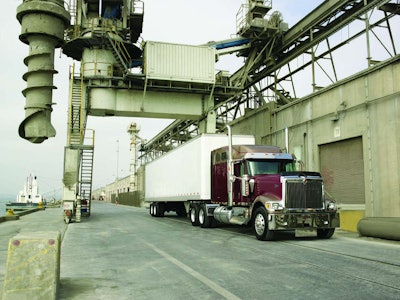 The national trade deficit fell by more than half over the eight-year course of the Obama/Biden administration, yet despite Trump having ran on a platform of decreasing the trade deficit in 2016, it has increased about 31%.
The national trade deficit fell by more than half over the eight-year course of the Obama/Biden administration, yet despite Trump having ran on a platform of decreasing the trade deficit in 2016, it has increased about 31%.Gizzi, who noted GDP growth for the eight years following the 2008 banking crisis was about 2.2%, while the rate of growth under the Trump Administration was about 2.5% prior to COVID, was similarly concerned with which version of Biden is seeking office.
“The GPD growth under both [the Obama and Trump] administrations was pretty close to being similar,” he said. “So, hopefully, we’ll have the old Biden leading that charge.”
Biden has pledged that he wouldn’t seek tax increases on anyone making under $400,000 annually, and any proposed corporate tax increases – which Biden said he would bump to 28% – Gizzi said, would almost certainly need the support of a Democratically controlled Senate.
“That’s about halfway between what it was before and what it is now,” he added of the rate hike. “If he does have a Democratic Senate, hopefully it won’t be 28% – maybe it’s somewhere in between the existing 22% and the 28% – or you give back some of the deductions that were taken away with the corporate tax break being where it’s at.”
The national trade deficit fell by more than half over the eight-year course of the Obama/Biden administration, yet despite Trump having ran on a platform of decreasing the trade deficit in 2016, “He’s done the opposite,” Gizzi said. “The trade deficit has increased about 31% since he took over.”
Some of that Gizzi attributed to Trump’s efforts to “reel in China with their trade policies and stealing our knowledge. I like that we’ve taken a tougher approach with China but it hasn’t stopped our deficit.”
Tariffs, he added, are not good for the overall economy, noting that heaping tariffs on the cost of goods sold actually pushed some jobs out of the country.
“Biden has been on record saying he’ll work to stop China’s stealing of our technology but he’s not going to do it with tariffs,” Gizzi said. “I’m an old GOP. Registered GOP. I like no tariffs. I like fair trade. I like free trade and I think that’s something that we’ve got to get back to.”
Despite the resulting bump in deficit, Larkin said Trump’s strong arm trade technique was appropriate given China’s political climate and stance on human rights.
“Doing business with the Chinese, rewarding them for taking advantage of their citizens, that doesn’t seem to make a whole lot of sense to me,” he said.
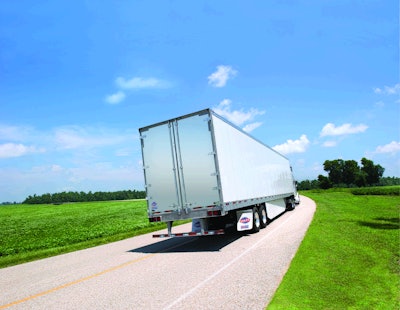 The U.S. highway system was the brainchild of Republican President Dwight Eisenhower, who oversaw the building of the interstate system alongside a Democratic Congress.
The U.S. highway system was the brainchild of Republican President Dwight Eisenhower, who oversaw the building of the interstate system alongside a Democratic Congress.Roads and bridges
Infrastructure spending will be a major issue staring down whomever collects their mail at 1600 Pennsylvania Avenue early next year.
“Our highway network is the best network in the world,” Larkin said, adding the U.S. historically has done a poor job of maintaining it and eliminating the bottlenecks that occur network-wide.
“The fuel tax has been the primary mechanism for funding highway infrastructure and it has not been increased since 1993,” Larkin added. “It’s not even been adjusted for inflation, which seems silly. And it has not been adjusted for the fact that most automobiles and most trucks are much more fuel efficient than they were back in 1993.”
If there is a beacon of bi-partisan hope, the U.S. highway system was the brainchild of Republican President Dwight Eisenhower, who oversaw the building of the Interstate system alongside a Democratic Congress. In the 64 years since, the American Society of Civil Engineers has given the country’s network of roads and bridges grades of C+ and D, respectively, in its Infrastructure Report Card.
“Let’s declutter the networks. Let’s eliminate the bottlenecks. Let’s repair the bridges and pavement structures and get them back to an A+ rating by the American Society of Civil Engineers,” Larkin said, “and I think Trump, as a builder, has that as a high priority.”
Larkin said he was surprised that Congress hasn’t been able to agree on a transportation program these past four years, adding that he thinks the per-gallon tax funding mechanism needs to be reconsidered and that past initiatives have consistently been shot down by Democrats.
“I thought President Trump had a real good chance his first term, when he had both the House and the Senate, to pass some really meaningful infrastructure spending,” Gizzi said, “and he just didn’t make it a priority, and that was discouraging. He had some really good ideas – I think he pledged $1.5 trillion in infrastructure with states and private grants. I like those ideas. There’s some validity to that. I think it was just one of those easy low-hanging fruits and he could have knocked it out in his first year and he didn’t.”
A highway spending plan will have to be put in place in the coming year and Gizzi agreed that it’s not likely to make a lot of difference who is president if the funding structure isn’t changed, adding he favored vehicle miles travelled as a better source of income and that he expects that “to be on the table within the next four years.”
“I think we have a better chance of that passing with Biden,” he said of a long-term infrastructure spending plan.


